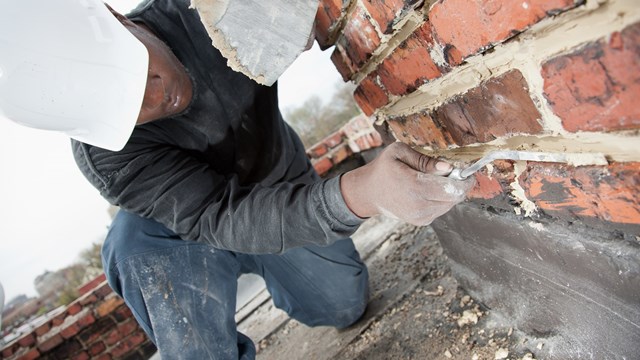
Whether it is redesigning light fixtures in a common space or replacing a roof, repair jobs and capital improvement projects are like death and taxes: they're inevitable. Though an HOA's property manager most often handles the hiring of contractors and oversees the execution of the job, problems and issues often arise that make it important for board members to understand licensing, documentation and accepted protocols of working with contractors.
The Basics
All too often, projects run long, cost more money than expected or contractors do not meet state mandated requirements for conducting business. These variables lead to headaches. So aside from cross-referencing recommendations, the most important aspect of hiring a contractor is determining that all licenses and insurances are current, explains West Palm Beach-based Attorney Alterraon Phillips who specializes in construction and Americans with Disability Act (ADA) issues.
“Anyone looking to hire a contractor should always request a copy of the contractor’s construction license, occupational license, and general liability insurance,” says Phillips, a state-certified building contractor with Phillips & James Construction Consulting in Loxahatchee. “A board/manager should request to be listed as additional insured on the contractor’s general liability insurance. For new construction, it's also recommended that the board/manager acquire builder’s risk insurance or require the contractor to obtain builder’s risk insurance for the project.”
Equally important at the onset of a project is requiring that the contractor have a payment and performance bond in place. “This will ensure the project is completed even if the contractor fails to be able to do so,” says Phillips. “Additionally, it ensures that the subcontractors and material suppliers are paid so a lien is not placed against the project/property.”
Sandi Copes Poreda, director of communications for the Florida Department of Business and Professional Regulation (DBPR), says that it is essential to obtain copies of all documentation and have it verified. “Generally, the Department would recommend that any consumer demand to see a copy of the contractor’s state or local license and a copy of their liability insurance certificate and workers’ compensation insurance certificate/worker’s compensation exemption,” says Copes Poreda. With this information, consumers can verify state licenses by visiting www.myfloridalicense.com.
With over 30 years experience, Clinton J. Ford of Advanced Building Consultants has provided consulting support to owners and managers during legal disputes with contractors, investigations of their contractor or subcontractors, licensure issues and permitting issues. Ford explains that in the state of Florida, there are three types of licensed contractors that boards should be aware of when entering into a contract.
“The first thing that has to be determined is that the contractor is in fact licensed in Florida,” says Ford. “Then they have to realize that there are three types of primary contractors: residential, building and general. Then there are trade contractors that handle plumbing and electrical or air conditioning, for example.”
In Florida, there are two designations for contractors: certified and registered. The former are licensed by the state and the latter are licensed by a municipality or a county. “The state is trying to fade out the registered contractors and will eventually,” says Ford. “There is a competency level issue with registered contractors because it can be obtained by filing out a form and paying fifty bucks. If there are incompetent contractors out there, they will eventually hurt the general public.”
Due Diligence
Within the construction industry, fraud is an unfortunate common occurrence which makes licensing and insurance that more important. However, even with the proper paperwork in place, problems can occur. In Chicago, for example, Krahl Construction allegedly caused losses of $9 million to its clients. The indictment brought forth by the FBI alleges that between 2005 and 2009 the company inflated the cost of renovation projects they performed and created false documents to support the inflated costs, resulting in over-billing. Krahl was considered a legitimate company, which makes oversight all the more important.
While the aforementioned is clearly a worst case scenario, when something goes wrong on a project, be it a license dispute or otherwise, who is to blame?
“Ultimately, it is the contractor’s responsibility to verify they are properly licensed,” says Phillips. “In accordance with Florida case law, if an owner—or board/manager—has no knowledge that a contractor is not properly licensed and finds out later in the project, the board/manager has no obligation to pay for the work completed by the unlicensed contractor. “
That being said, Phillips says, “A responsible board/manager would inquire as to the status of the contractor’s license and contact the Florida Department of Business and Professional Regulation and the Better Business Bureau.”
Copes Poreda explains there is a fail-safe measure in place to avoid these types of issues. “The county or city building department is responsible for confirming a contractor’s license prior to issuing a building permit for a particular project,” she says. “The building’s or property’s governing documents will determine which individual(s), if any, are required to verify licensure on behalf of the building itself.”
Grey Areas
For many building managers and boards, the issue of subcontractors is elusive. Often these trade professionals are brought in after the permit has been approved and the contract was signed leaving the decision to the general contractor. If something goes wrong, Copes Poreda says, “The consumer may file a complaint with the Department that may result in administrative penalties against an unlicensed contractor or a contractor who fails to maintain adequate insurance,” she continues. “The Department would determine if the unlicensed individual was performing work that required a license or did not meet an exemption for licensure. The consumer may also have civil remedies available to them and would need to consult an attorney for appropriate legal advice.”
Ultimately determining which party is responsible depends on contractual variables, notes Phillips. “Unless the board/manager is hiring the subcontractors directly, the subcontractors are typically hired by the general contractor,” he says. “The board/manager is typically in privity—under contract—only with the contractor. Therefore, the contractor is responsible for the subcontractors they hire.”
Proactive Insurance
When it comes to insurance and workers’ compensation, there are again grey areas. As is the case with verifying a contractor’s license with the Florida Department of Business and Professional Regulation, a manager or board member has to verify insurance papers. “The certificate of insurance has to be valid and that requires a board or manager calling the insurance carrier directly,” says Ford. “And, this certificate of insurance can’t be submitted by the contractor, it has to come from the insurance agency.”
Ford explains that he is currently working on a personal injury case where a contractor submitted insurance paperwork directly to the manager and there was a serious accident on site but it turned out there was no insurance. “When it comes to anything in construction, you have to document, document, document,” says Ford. “When it comes to workman’s compensation insurance, it is important to determine that the insurance covers the work or type of work being performed. A building contractor, for example, may not be covered if working on a roof, it all depends and it has to be verified.”
While not common, there are instances where an individual resident is adversely affected by a renovation or maintenance project. In this case, the unit owner has options, explains Copes Poreda. The proper procedure, she notes, is to first contact the association manager to determine if the contractor is properly licensed. “Section 455.227(1)(j), subjects a manager to disciplinary action for aiding an unlicensed person in the practice of a profession. If the manager does not provide access to the requested paperwork regarding the licensed contractor, then this could be a violation of Chapter 61E14-2.001(6)(a), Florida Administrative Code,” she says.
Regardless if a unit owner is affected or not, Copes Poreda says they have the right to view association documents that are not protected via attorney-client privilege. “If a unit owner discovers that a contractor isn’t licensed, they should contact the local building authority and/or file a complaint with the Department.”
If a construction malpractice or fraud case is elevated and significant problems arise, an investigation into how the manager and board vetted (and eventually hired) the contractor can result. “The consequences and legal issues that arise depend on the circumstance. If the company/individual is unqualified/unlicensed, the option of repairing the defect and/or damage is not available as they have to be licensed to do the work,” says Phillips. “It is also unlikely they will be insured if they are unlicensed and unqualified. If they are uninsured, the building is unlikely to collect any monetary damages even if you prevail in court.”
Phillips notes that most contractors do not have readily available funds or financial backing to cover monetary damages that may be awarded in a lawsuit. “In such case, you have to go back to court to try and collect the monetary damages or enforce the court order,” Phillips continues. “This can become very costly for an owner. And, if you previously paid the first contractor, you are likely to have to pay the next contractor to correct the damages caused by the first.”
W.B. King is a freelance writer and a frequent contributor to The South Florida Cooperator.






Leave a Comment